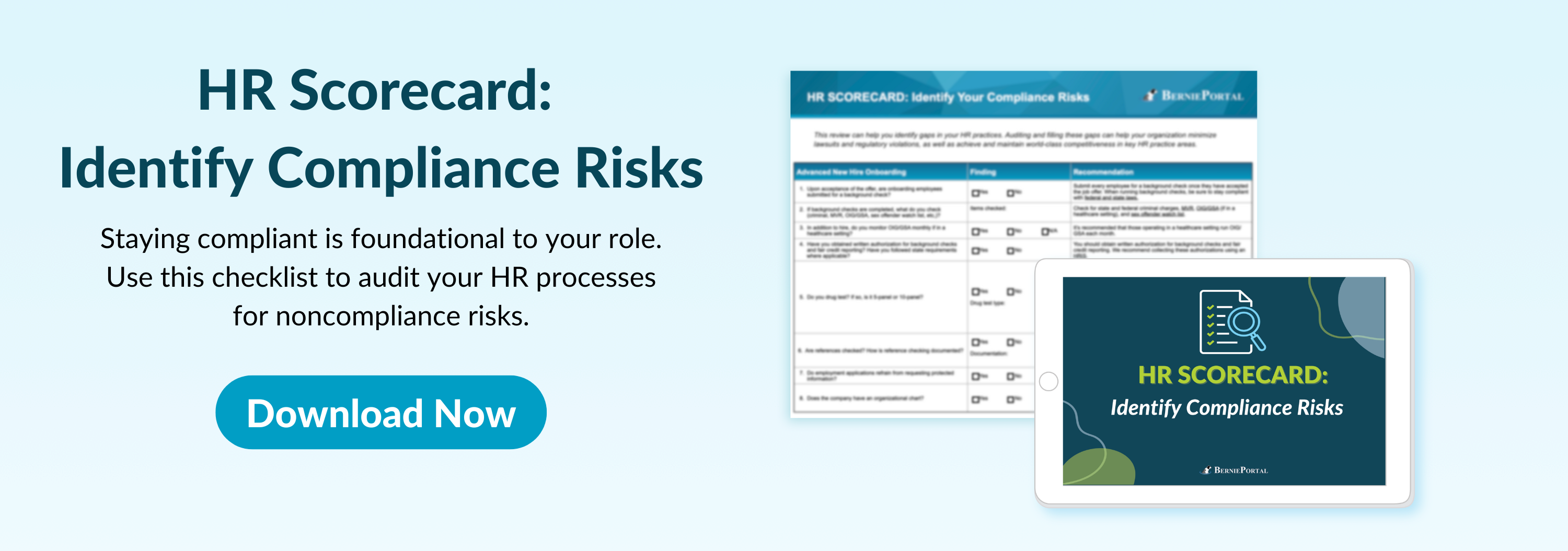Written by
Will Miranne
Will is an aPHR-certified writer on the marketing team at BerniePortal. He writes about healthcare, human resources, and benefits.
FTC Announces New Rule to Ban All Non-Competes

Non-competes have played a significant role in the business sector, preventing employees from leaving companies for competitors and preventing employers from scouting employees from rival businesses. Non-competes may be the cornerstone of many employers' employee contracts to protect organizational strategies.
In January 2023, President Biden through executive order directed the Federal Trade Commission (FTC) to ban non-competes. Now, legislators are set to vote in 2024. With change potentially on the horizon, how might the proposed non-compete ban affect small to midsized employers?
What Is a Non-Compete?
Non-competes are written contracts between employees and employers stating that employees can’t compete with the employer after leaving the company.
The goal of the agreement is to reduce competition against them in the employee’s next position. A non-compete may, for example:
-
Working for a competitor in the same market
-
Starting up another business in the same field
-
Recruiting the company’s employees to leave with them
Employers may use these agreements to protect themselves from previous employees revealing:
-
Company secrets
-
Private company information
-
Company operations
-
Client information
-
Company pricing
-
Company strategies, etc
Are Non-Competes Different From NDAs?
An NDA is a nondisclosure agreement between an employer and an employee. These usually cover what an employee can share about their job—their role, information about internal processes, developments, financial data, etc. NDAs—like non-competes—are commonly used to prevent employees from joining competitors and sharing potentially sensitive information.
The primary difference between the two agreements is that an NDA is a broader contract. Non-competes specifically inform employees what kinds of business they cannot work for should they leave the organization.
What Does the Proposed Non-Compete Ban Affect?
At the start of Jan. 2023, The Federal Trade Commission announced a proposal to ban all non-compete agreements. In conjunction with the proposal, the FTC released a fact sheet outlining the factors affecting the decision. One such factor was the stark increase in employee compensation across all industries and sectors. The FTC estimates a total increase of $250 billion to $296 billion in earnings.
The impetus of the proposal stems from legislative concerns that non-competes impede employee satisfaction by reducing their ability to find work in a more suitable workplace. It also limits the employee pool for employers looking to rebuild their workforce and fill crucial roles.
It is important to note that, as of now, the rhetoric used in the rule is broad. The FTC language says: "A contractual term between an employer and a worker that prevents the worker from seeking or accepting employment with a person, or operating a business, after the conclusion of the worker’s employment with the employer."
Should this be intentional, it may signify a desire to establish a more general ban on non-competes without regard for position or compensation. An article by law group JD Supra points to the broad language as a reason to believe that "[by using] such a broad definition, this clause could include not only traditional non-competes but also non-solicit agreements, severance agreements, non-disclosure agreements, and contracts that require the repayment of education costs."
This proposal is significant in scope and has been on the horizon since Biden first announced the executive order to bring limitations and restrictions to non-compete agreements last year. Should it pass, organizations must relieve employees of all non-compete agreements and notify them of the rescinded contracts. However, there are still concerns to address, such as whether franchises will be subjected to the rule.
Another concern has to do with the level of compensation an employee receives. This concern points to executives and high-level employees making sizable salaries. Compensation-based restrictions have previously applied at the state level, such as in Illinois.
Ashley Herd, CEO of Manager Method, clarifies that the proposed rule "applies to employees AND independent contractors." "Nothing happens today... There is a 60-day comment period (which could be extended), and then the FTC takes time to decide on a final rule, which then takes effect six months later. So, nothing official until late 2023, at least."
Herd breaks down the new rule in this brief video.
What Does the Non-Compete Ban Mean for Employers?
This ruling can help employees seeking new employment and employers challenged by small talent pools. In the current market, employees still hold the upper hand, so limited talent pools can devastate businesses struggling to stay afloat.
Should this proposal go into effect, affected organizations should reevaluate their recruiting strategies to account for the increased talent options. Many organizations can leverage DEI policies and culture to attract candidates previously locked into non-competes.
On the flip side, businesses that have traditionally benefited from non-competes may need to rethink their strategy. For example, an employer in the freight industry may need to find different ways to ensure they retain sales employees with large books of business to keep those revenue streams. Employers will need to leverage compensation packages, review benefits offerings, establish robust DEI strategies, and evaluate their company culture to determine if they have the necessary offerings to maintain retention without help from the non-compete.
Regardless of stature, industry, or offerings, your organization may feel this proposal's effects if it's enacted. Consider how the rule may impact your industry and create an actionable plan. You can prepare by making retention a focus of your efforts, so valuable revenue streams remain with your organization rather than following key talent out your door.
If ill-prepared, you could lose out on new talent or see a sudden decrease in retention. By staying up-to-date, you can remain ahead of the curve and avoid being blindsided by a sudden shift in your industry.
Additional Resources
You can also stay informed, educated, and up-to-date with non-competes and other important topics by using BerniePortal’s comprehensive resources:
-
BernieU—free online HR courses, approved for SHRM and HRCI recertification credit
-
BerniePortal Blog—a one-stop-shop for HR industry news
-
HR Glossary—featuring the most common HR terms, acronyms, and compliance
-
HR Guides—essential pillars covering an extensive list of comprehensive HR topics
-
HR Party of One—our popular YouTube series and podcast, covering emerging HR trends and enduring HR topics
Written by
Will Miranne
Will is an aPHR-certified writer on the marketing team at BerniePortal. He writes about healthcare, human resources, and benefits.
Related Posts
HR may use 6 types of background checks: identity verification checks, criminal record...
Yes, employees have a right to pray at work, but there's more to it than that. Read on...
49 out of 50 states in the U.S., all but Montana, follow at-will employment, so if you’re...
Many employers enjoy giving young people access to good jobs and opportunities. However,...








Submit a Comment